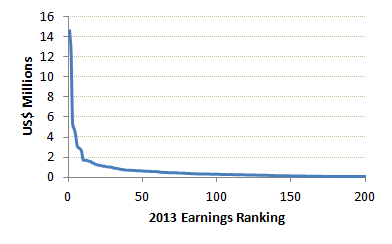How Many People Win at Sports Betting?
Posted 10th December 2013
How many winners are there in sports betting? That's a bit like asking how long is a piece of string? Until we define what it is we are really asking it's a pointless question. What I'm really getting at here is what proportion of sports bettors are winning over the longer term, not just a few lucky bets? Or to be more specific, what proportion of sports betters are winning because of their skill?
I've already talked plenty about the difference between luck and skill in betting and it isn't necessary here to go over the material again. Suffice it to say if you still don't understand the difference, you need to find out before you end up on the wrong side of the profit line. I've also discussed at length why many online bookmakers are only too quick to stop winners winning. Again, I won't repeat myself here. For the sake of this discussion, we can assume that we are dealing with bookmakers who are happy to accept winners without reserve.
So how do we go about finding out how many punters are winners and how many are losers. Well, we could ask the bookmaker. It's a fairly sure thing, however, that the chances of him telling us are about the same as the chances of the Sun not being there tomorrow. We could refer to anecdotal evidence. There are plenty of one-liners on the Internet making statements like "97% gamblers lose", indeed I've done it myself. But is there really any evidence to back this up? Presumably, such figures have infiltrated online discussion about sports betting via a mixture of drip-fed information from unknown sources and gambling folklore. Intuitively, it must be fairly obvious that there can't be too many punters doing well, because - and here's another anecdote - we never find a poor bookmaker do we. With a profit margin built into their betting markets, it stands to reason that the bookmaker must, on average, win far more than his punters.
However, with the new breed of highly efficient, low-margin bookmaker now increasingly available to the customer, this punter disadvantage is as low as it's ever been. Suppose for the sake of argument it was 0%. What's to then stop us hypothesising that as many as 50% of punters could be winning, and winning just from luck alone? Sadly, from the perspective of the vast majority of punters, the world of sports betting is not like that, as we shall now see.
For games of pure chance, like roulette or dice, there is no role whatsoever to play for skill. However one chooses to bet, the outcomes and your profitability will purely be determined by chance. By contrast, for games of pure skill, the stronger player will invariably beat the weaker one. Where the difference in skill is significant the stronger player will probably win close to 100% of the time. Where there is only a very small difference, the weaker player will win more, but over the course of many tens or hundreds of games, it's almost a sure thing that he won't win as many as his opponent. And it's exactly the same laws of probability as I've discussed many times before that are at work here. Similarly, for contests where both chance and skill have an influence, whilst chance may dominate in the short term, the difference in skill levels will be the over-riding factor over the longer term. Since sports betting is effectively a contest of both luck and skill, we can expect to see more skilled punters dominating over their weaker counter parts as time, or more crucially the number of bets, progresses
Suppose two players bet fair even-money propositions against each other, and suppose one of them is just 2% better at forecasting than the other. In such a scenario, the slightly more skilled player will win 51% of the time, whist the weaker player will win 49% of the time. What are the chances of one player winning money off the other? The table below provides a pretty clear illustration of what can be expected to happen.
2% Difference in skill level | |
| Number of bets | Chance of weaker player making a profit | Chance of stronger player making a profit |
| 100 | 38.19% | 54.01% |
| 200 | 36.17% | 58.42% |
| 400 | 32.63% | 63.69% |
| 800 | 27.38% | 70.21% |
| 1,600 | 20.46% | 78.09% |
| 3,200 | 12.52% | 86.73% |
| 6,400 | 5.34% | 94.38% |
After just 400 bets, the stronger player is nearly twice as likely to beat his weaker opponent, despite the difference in skill level being just 2%. When this difference is increased to 5% the speed at which the stronger player will being to assert his dominance is even more striking.
5% Difference in skill level | |
| Number of bets | Chance of weaker player making a profit | Chance of stronger player making a profit |
| 100 | 27.38% | 65.60% |
| 200 | 21.80% | 73.82% |
| 400 | 14.66% | 82.93% |
| 800 | 7.34% | 91.62% |
| 1,600 | 2.14% | 97.60% |
| 3,200 | 0.22% | 99.75% |
| 6,400 | 0.00% | 100.00% |
When the difference is as much as 10%, the sort of difference that the best sports handicappers are capable of, you might as well just pack up and go home. Even after just 500 bets, the weaker player has little more than a 1 in 100 chance of out-scoring his opponent. And past 1,000 bets the game is as good as over.
The lesson from this analysis is clear. If you are in sports betting for the long haul, you'd better make sure you get yourself and edge. Without it, you're in trouble, and in trouble pretty quickly.
Forecasting skills amongst a betting population will vary in a similar way to other natural phenomena. The distribution of skill level amongst punters will possibly resemble something like the Poisson distribution. You don't need to know what that is, suffice it to say that it will look a little bit like that for daily recorded rainfall totals. Just as there are many days with little or no rainfall, some days with a bit of rainfall, still fewer with quite a lot of rainfall and only a small proportion where large amounts have fallen, so forecasting ability will likely be distributed such that most will have little or none, some will have a bit, whilst only a few will have considerable skill. Whatever the shape of the distribution, and even if it resembled more of a normal bell-shaped curve with as many skilled punters as unskilled, it is clear from the analysis earlier that the most skilled ones will dominate over the rest. Since punters are really just betting against other punters (with the bookmaker just facilitating the action and taking a small cut in the form of the overround) it is the differences in skill level rather than the absolute value of skill that is the significant factor.
Not only that, but because the most skilled punters know they can dominate, they will tend to be the ones staking the most money, simply because their past performance has proved to them that they have the necessary skill level to succeed. Such a picture is a little bit like the chess grandmaster simultaneously taking on 50 other hopefuls. Because his or her skill level is better than everyone else, the likelihood is that (s)he'll win every single game. In sports betting it won't be that bad, because of the role of chance over the short term, but in the long run the same bleak outlook will exist for all the weaker players.
None of this still takes us much nearer towards answering our original question. We know that it's likely to be less (probably a lot less) than 50%. This is quite typical for such a "winner takes all" market. Professional tennis is another example of "winner takes all". Indeed, just like for sports betting, it doesn't really matter how good, in absolute terms, a player is. What counts is how much better (or worse) he (or she) is against all the opposition. Differences in skill level are the key. What is more, just like for sports betting, the "winners" tend to end up playing more games than the "losers", because of the knockout nature of the sport. Whilst sports punters won't get knocked out in the same way, it is easy to recognise that the more profitable you are at sports betting the more likely it is that you will bet larger amounts, simply as a consequence of staying in the game longer, if not bettting more each time (which will almost certainly be true as well). So let's have a look at some data from the world of professional tennis.
The chart below shows the earnings for the top 200 earning ATP (men) tour players (singles and doubles). Unsurprisingly, just a handful of the world's best take the lion's share of the tournament prize money. In fact Nadal (no, 1) and Djokovic (no. 2) took nearly a fifth of the whole lot in 2013. Murray, 3rd, won less than a third of what Nadal did. And once you're outside the 100 (indeed even the top 50), it will become much more of a struggle to fund the lifestyle, with much of the prize money going on coaching, travel, equipment and tax. Of course, my heart will not bleed for these players just yet, since many will also earn well from sponsorship, but that's another story. The obvious point here is that based on tournament winnings, it's clear that professional tennis is a "winner takes all" game. Even small differences in skill level can make a big difference to the earnings potential of the player.

How does their pure performance stack up? This time I've simply analysed a player's win-loss record. For the sample, I've included every tennis match I've personally collected for Tennis-Data.co.uk. For men's singles this goes back to the year 2000, whilst for the women's WTA singles tour I have data back to 2007. This makes a total of 56,267 matches, containing a total of 1,844 different players. All games, including retirements, walkovers and the one where David Nalbanian threw his racket out of the pram and got himself disqualified have been included. A win is a win after all, however it came about. I've then calculated each player's net win number; that is the number of wins take away the number of losses, and ranked them. The findings are quite revealing, and support Andy Murray's defence against public and journalistic criticism that most of the time tennis players find themselves losing games.
Unsurprisingly, Roger Federer is at the top of the tree in absolute terms, with a net win number of 683. This is because he's been so good for so long and because he's been playing for the whole of the duration of my data sample, unlike others including Rafael Nadal, Serena Williams, Justine Henin and Lindsey Davenport, who all actually have better win ratios in this sample of data. Below Federer, net win number drops fast. Nadal is at 507, Djokovic at 391, Roddick at 379 and Hewitt at 303. By the time we get to the 45th ranked player in this data sample, Guillermo Coria, this figure has dropped below 100. Obviously my sample doesn't contain a lot of matches that Coria played during the 1990s, but that is not the point. The key point here is that there are only relatively few players with a positive win-loss record. In fact in this data sample there are just 193 of them, or 10.5%. The remainder of the 1844 players have negative win-loss records, having lost more games than they have won.
Let's take this data then and create a hypothetical betting scenario. Suppose when a player wins a match he makes a profit of $0.95 and when he loses a match he has to pay $1.00. $0.05 is given to the management firm running this game when a player wins a match, effectively the same as the standard commission rate at Betfair. Federer has made a profit of $639.40. He is followed by another 177 players who have managed to walk away with something. In total this represents just 9.7% of the total sample of players. Only 36 of them, or 1.9% have made more than $100. Things become even worse if the winning commission increases to 12%, which is roughly equivalent to a typical tennis match overround of 106%. Now only 151 players, or 8.2%, have been profitable, with just 26, or 1.4% earning over $100, compared to Federer's highest earnings of $578.36. Indeed, two-thirds of these profitable players have earned less than a tenth of what Federer has managed to deliver. The picture is clear. Only the best tennis players win enough times to be able to make a profit from this theoretical game. Furthermore, only a tiny number do really, really well. Professional tennis clearly is a "winner takes all" contest.
Of course, a population of professional tennis players competing in knock-out competition is not going to be exactly representative of a distribution of profitability amongst sports bettors. As I've already alluded to, when a punter loses a bet, he's not knocked out of the game. Furthermore, in tennis one player is taking on just one other player in a match. In sports betting, by contrast, your stake is potentially being wagered against a significant number of other players who have adopted the opposite opinion to yours. Additionally, the population of bettors and the number of wagers they strike will be far, far larger than the tennis sample I have analysed here. Nevertheless, the dramatic influence of relative skill ranking amongst tennis players will clearly be one that will be replicated to some degree amongst a population of sports bettors, which as we have already seen will experience quickly diverging performances for even small differences in skill level. And the extent to which "winners" will naturally be staking more (just as Federer gets to play more matches because he wins his earlier rounds) will mean that a much greater proportion of "losers" will have to pay for this.
To conclude, then, if sports betting is anything like professional tennis, with a "knock-out", "winner-takes-all" culture, we cannot realistically expect to see more than 10% of punters making a long term profit, and probably less than 1% showing anything that might be described as professional. In reality, these figures will probably be even smaller, given that the relative skill levels amongst sports bettors are a lot more divergent than those for tennis players. In tennis, furthermore, the lowest ranking players will generally be playing others of similar ability, with far fewer games played against the best. In sports betting, by contrast, a mug punter can find himself up against a pro at any time. So if you find yourself on the wrong side of the profit line, at least you can console yourself with the knowledge that you're not alone.
|






